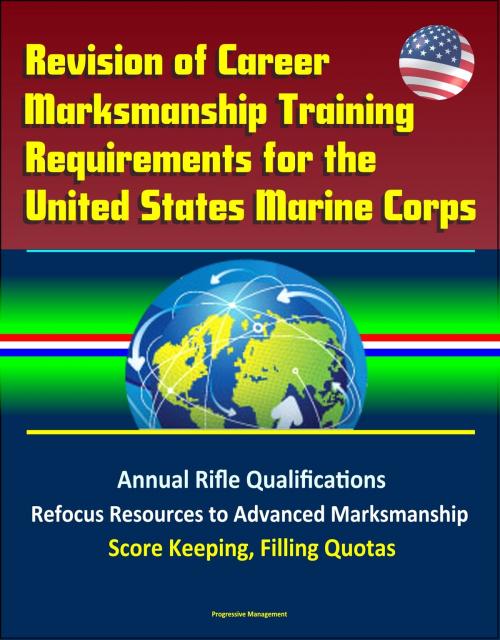Revision of Career Marksmanship Training Requirements for the United States Marine Corps: Annual Rifle Qualifications, Refocus Resources to Advanced Marksmanship, Score Keeping, Filling Quotas
Nonfiction, History, Military, Weapons, United States| Author: | Progressive Management | ISBN: | 9781370009374 |
| Publisher: | Progressive Management | Publication: | October 7, 2016 |
| Imprint: | Smashwords Edition | Language: | English |
| Author: | Progressive Management |
| ISBN: | 9781370009374 |
| Publisher: | Progressive Management |
| Publication: | October 7, 2016 |
| Imprint: | Smashwords Edition |
| Language: | English |
This important report has been professionally converted for accurate flowing-text e-book format reproduction. Current Marine Corps policy requires that all Marines below the rank of Gunnery Sergeant and with fewer than 13 years of service undergo annual rifle qualification. Annual marksmanship training is repetitive and only addresses the fundamentals of marksmanship, which Marines typically master in their first few years. Key features of marksmanship training are instilled at initial training for officers and enlisted Marines, but advanced training is seldom received outside infantry and select occupational fields. Operational tempo or limited range availability may also make it impossible for some Marines (or entire units) to attend. Analysis of all recorded marksmanship scores from the past 20 years shows no significant changes in proficiency for Marines continuing to conduct sustainment under the current or previous policy. The current Marine Corps policy can be adjusted to increase the overall lethality of the force by recognizing earlier proficiencies with marksmanship skills and allowing Marines who have shown proficiency to advance to intermediate and advanced combat marksmanship training. The Marine Corps can refocus resources by conducting fewer sustainment-level rifle qualifications, allowing units to more efficiently schedule marksmanship training commensurate with the Marine's level of proficiency.
CHAPTER I - INTRODUCTION * A. THE PURPOSE OF THIS RESEARCH * B. RESEARCH QUESTIONS * C. RESEARCH GOAL * CHAPTER II - MASTERING MARKSMANSHIP * A. THE KEY TO SUCCESS ON THE BATTLEFIELD * B. MARINE CORPS ORDERS GOVERNING MARKSMANSHIP TRAINING * 1. Current Orders * 2. Previous Orders * C. ENTRY-LEVEL TRAINING * D. FUNDAMENTALS OF MARKSMANSHIP * E. MARINE CORPS SUSTAINMENT TRAINING * F. THE MENTAL CONNECTION IN MARKSMANSHIP * G. ADVANCEMENT IN TRAINING AND WEAPONS * 1. Marksmanship in Battlefield Conditions * 2. Evolving the Systems Approach to Training * 3. Retention of Skill * H. SUMMARY * CHAPTER III - INSIGHT INTO DATA INTERPRETATION * A. RAW DATA COLLECTION * 1. Original Data * a. Identification. * b. Military Occupational Specialty * c. Present Grade * d. Gender * e. Armed Forces Active Duty Base Date * f. Date Fired * g. Score * 2. Data Comparisons * a. Three Qualification Levels * b. Sublevels within Each Qualification Level * 3. Data Shortfalls * B. RIFLE RANGE ATTENDANCE * 1. Filling Quotas * 2. Repetition in Training * 3. Bottom Heavy Marine Corps * 4. Range Availability * 5. Ownership * 6. Ignored Factors of Marine Corps Marksmanship Scoring * 7. Rifle Scores Focused Research * C. EXEMPTIONS AND WAIVERS. * 1. Exemptions * 2. Waivers * 3. Conservation of Resources * CHAPTER IV - ANALYSIS OF PROGRESSION * A. HAVE MARINES IMPROVED? * 1. Typical Marksmanship Improvement * 2. Score Keeping * 3. Oversight * 4. Perception of Hit-Or-Miss Style Qualification * B. INTANGIBLE FACTORS * CHAPTER V - OBSERVATIONS, CONCLUSION, AND RECOMMENDATIONS * A. OBSERVATIONS * 1. Answering the Research Questions * 2. Progressive Qualification * B. CONCLUSION * C. RECOMMENDATIONS * CHAPTER VI - SUGGESTED FOLLOW-ON RESEARCH
This important report has been professionally converted for accurate flowing-text e-book format reproduction. Current Marine Corps policy requires that all Marines below the rank of Gunnery Sergeant and with fewer than 13 years of service undergo annual rifle qualification. Annual marksmanship training is repetitive and only addresses the fundamentals of marksmanship, which Marines typically master in their first few years. Key features of marksmanship training are instilled at initial training for officers and enlisted Marines, but advanced training is seldom received outside infantry and select occupational fields. Operational tempo or limited range availability may also make it impossible for some Marines (or entire units) to attend. Analysis of all recorded marksmanship scores from the past 20 years shows no significant changes in proficiency for Marines continuing to conduct sustainment under the current or previous policy. The current Marine Corps policy can be adjusted to increase the overall lethality of the force by recognizing earlier proficiencies with marksmanship skills and allowing Marines who have shown proficiency to advance to intermediate and advanced combat marksmanship training. The Marine Corps can refocus resources by conducting fewer sustainment-level rifle qualifications, allowing units to more efficiently schedule marksmanship training commensurate with the Marine's level of proficiency.
CHAPTER I - INTRODUCTION * A. THE PURPOSE OF THIS RESEARCH * B. RESEARCH QUESTIONS * C. RESEARCH GOAL * CHAPTER II - MASTERING MARKSMANSHIP * A. THE KEY TO SUCCESS ON THE BATTLEFIELD * B. MARINE CORPS ORDERS GOVERNING MARKSMANSHIP TRAINING * 1. Current Orders * 2. Previous Orders * C. ENTRY-LEVEL TRAINING * D. FUNDAMENTALS OF MARKSMANSHIP * E. MARINE CORPS SUSTAINMENT TRAINING * F. THE MENTAL CONNECTION IN MARKSMANSHIP * G. ADVANCEMENT IN TRAINING AND WEAPONS * 1. Marksmanship in Battlefield Conditions * 2. Evolving the Systems Approach to Training * 3. Retention of Skill * H. SUMMARY * CHAPTER III - INSIGHT INTO DATA INTERPRETATION * A. RAW DATA COLLECTION * 1. Original Data * a. Identification. * b. Military Occupational Specialty * c. Present Grade * d. Gender * e. Armed Forces Active Duty Base Date * f. Date Fired * g. Score * 2. Data Comparisons * a. Three Qualification Levels * b. Sublevels within Each Qualification Level * 3. Data Shortfalls * B. RIFLE RANGE ATTENDANCE * 1. Filling Quotas * 2. Repetition in Training * 3. Bottom Heavy Marine Corps * 4. Range Availability * 5. Ownership * 6. Ignored Factors of Marine Corps Marksmanship Scoring * 7. Rifle Scores Focused Research * C. EXEMPTIONS AND WAIVERS. * 1. Exemptions * 2. Waivers * 3. Conservation of Resources * CHAPTER IV - ANALYSIS OF PROGRESSION * A. HAVE MARINES IMPROVED? * 1. Typical Marksmanship Improvement * 2. Score Keeping * 3. Oversight * 4. Perception of Hit-Or-Miss Style Qualification * B. INTANGIBLE FACTORS * CHAPTER V - OBSERVATIONS, CONCLUSION, AND RECOMMENDATIONS * A. OBSERVATIONS * 1. Answering the Research Questions * 2. Progressive Qualification * B. CONCLUSION * C. RECOMMENDATIONS * CHAPTER VI - SUGGESTED FOLLOW-ON RESEARCH















